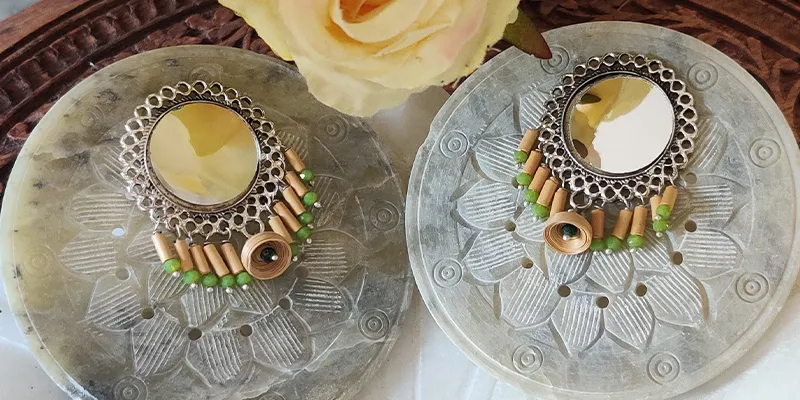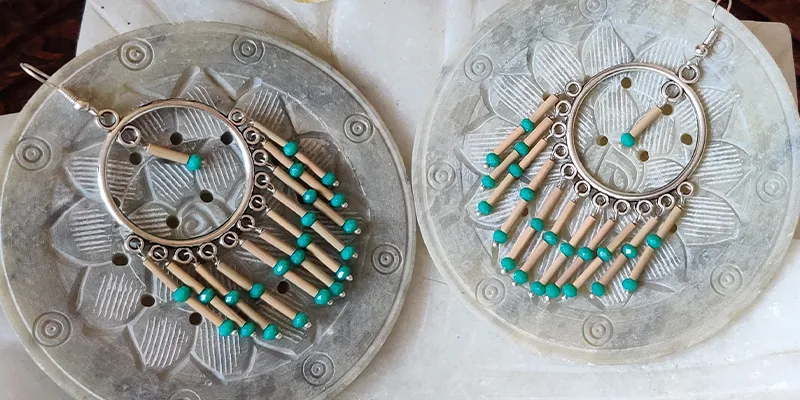Green Gold: How Baansuli is improving the lives of skilled artisans by helping them sell handmade bamboo jewellery
The artisans of our country need motivation and support, says Saloni Sacheti, who launched Baansuli, a social enterprise that is helping skilled artisans sell their beautiful handcrafted jewellery to an urban clientele.
The art of creating bamboo jewellery is a unique craft, usually done by highly skilled artisans. These handcrafted collections, made by splicing, weaving, and polishing bamboo and intertwining them with braided wire, adding silver, ruby, coral or turquoise stones, requires many hours of painstaking work.
This jewellery is remarkable, not only because of the elaborate craftsmanship that goes into making each piece, but also because of the skill of each artisan.

Baansuli's bamboo jewellery is light weight and contemporary
Whether it is an intricate bamboo neckpiece inlaid with blue stones and an overlay of silver or an earring with beautiful beads and hoops, each piece of jewellery is a collector’s delight and a labour of love that has lasting value.
YSWeekender caught up with Saloni Sacheti, Founder of Baansuli, a social enterprise, which helps a group of tribal artisans from the district of Dang, Gujarat, sell their handcrafted bamboo jewellery to an urban clientele and be economically empowered. BAANSULI, which stands for Bamboo Artisan Socio Economic Upliftment Initiative, is also an amalgamation of two words — Baans, which means bamboo and Hansuli, a term used to describe a jewellery pattern.

Saloni Sacheti
After graduating in Law from Benaras Hindu University, Saloni started her career at a firm that dealt with electricity laws. But she wasn't happy.
She says, "While sitting in my cubicle, I used to wonder if I was doing something meaningful with my life. Eventually, I left my job and launched Baansuli, which has given me great satisfaction and happiness."
In this interaction, Saloni talks about her initiative and why artisans and their workmanship should be encouraged and supported in order to keep our ancient crafts alive for generations to come…
Edited excerpts from the interview:
YSWeekender (YSW): How was the idea of Baansuli conceived?
Saloni Sacheti (SS): Dang, situated in the southern part of Gujarat, is an area with an abundance of bamboo. However, it is also one of the most economically distressed districts in the country. Almost 98 percent of the population is tribal and 88.83 percent of the population is dependent on agriculture. But due to the hilly terrain, people here face a lot of water scarcity problems post-monsoon. As a result, there is a seasonal migration of cultivators and agriculture labourers for manual labour to the nearby cities.
When I went to this region during my studies, I saw the condition of the people and decided to help them gain a livelihood. As a result, Baansuli was conceived to help give the tribals of the region a regular source of income and stop seasonal migration.
The people here are well versed with bamboo and its crafting. I decided to form an initiative that would make contemporary bamboo jewellery and sell the products to an urban market.
YSW: How did you go about launching Baansuli?

Each piece of jewellery is inlaid with semi-precious stones
SS: Bamboo jewellery is not new in India, as it is already being made in Northeastern states.
I began designing contemporary pieces with different elements like semi-precious stones, pearls, German silver, tassels, and thread work. Each customer who buys our jewellery gets a two-fold story card talking about our organisation, artisans, and the jewellery.
We also provide a handmade reusable box with our products.
YSW: What is the USP of your brand?
SS: We specialise in uniquely handcrafted bamboo earrings made from a locally sourced variety of Manvel bamboo, which undergoes chemical preservation treatment for durability and protection against organic decay.
Our jewellery is durable, lightweight, and contemporary.
YSW: Who designs the jewellery?
SS: We work together as a team to design each piece but the initial designs are done by me. Later, we seek inputs for the designs from the artisan fraternity.
Each piece of jewellery is inspired by something we love. This time we took inspiration from the palaces of Jaipur and Agra.
YSW: How has your business developed over time?

Saloni's initiative has won many accolades
SS: Our first exhibition in Dastkar in Delhi received a huge response. Later, we won the 3M CII Young Innovator Challenge Award under the rural category in 2018, and the following year, we got the Best Startup Award for Sustainable Livelihood from the National Institute of Rural Development. We were one of the top 18 social innovators at the Pune International Centre at their National Conference on Social Innovation.
Soon, we began getting recurring orders from five-star resorts, souvenir shops, retailers, distributors, emporia, and many other places. People loved this green gold and wanted to have more of our jewellery in their wardrobes.
YSW: How should people encourage the highly talented artisans in our country?
SS: Apart from motivating and encouraging them, it is also important to provide fair, sustainable wages to our artisans as it empowers them to take care of themselves and their families. Mere appreciation of any art form is not enough. It is also important to buy these products as well.
Each handmade product has its story and the person who created it puts a lot of time and effort into making handicrafts that are unique, beautiful, and made just for you. When you support traditional crafts, you help our artisans to pass on their skills to the next generation and keep our arts and crafts alive.
(Images credit: Baansuli)
Edited by Saheli Sen Gupta









